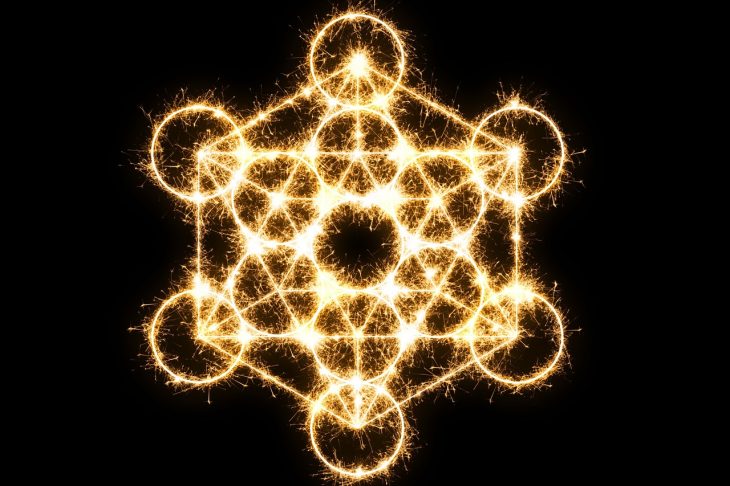It’s Magic

Good day, Readers!
Well, that sounded more passive-aggressive than I intended. Let’s ignore that. One of the beautiful things about social media is the discourse that can be had about all manner of things. Some of it is awful — alright, a lot of it is awful — but it isn’t always. What crossed my feed this week was not one of the awful things, but rather brought up a really interesting discussion about magic in fiction; and how people prefer to consume it.
I’ll spoil it right away: some people require a very rigid construction of magic and magical systems. Other folks, not so much. Here is what kicked it all off:

From the discussion I saw there are two camps only; two circles that in absolutely no way touch even a little: Yes, this is true. All must be explained. OR Absolutely not, in no way is this true. What madness is this? Forget about any sort of middle ground.
This is fascinating to me.
Now to be clear, I don’t think either camp are ‘correct.’ They’re just personal preferences, and claiming one is better or more true than the other is silly and reductive. But I’m always interested in differences of opinion of this nature and why folks think the way they do about it. For myself, I happened to wildly disagree with the above, and I’ll tell you why (because we’re all desperate to know, I’m sure).

First, a lot of what the OP is asking for can usually be inferred. If the story is written well enough, there isn’t a need to state explicitly that things work one way or another. It can be implied. To be honest, if a writer stops to explain all of the above often makes the writing clunky and odd, drags me out of the story, and irritates the bejeebus out of me. Bejeebus is the technical term. I find it condescending. Thank you, Mx Writer, I can figure it out for myself.
A well written story will show the reader/viewer many of those things without stating it explicitly. No explanation needed.
Beyond that, sometimes there’s no need to explain anything at all. Just showing me that this is what happens is quite enough. I don’t need it explained. The why and how are utterly irrelevant to me. I just need to know it is. This is particularly true of magic systems. It’s magic, not technology. I don’t require a primer on magic in the world to accept that it’s magic. It’s magic is the explanation. Taking the time to explain all the rules and limits kind of, well, takes the magic out of it. I understand that’s not the same for everyone, and that’s fine.

The thing with films and novels is that they’re not table top role-playing games. For obvious reasons, knowing all the rules, limits and mechanics of the magic system and world is crucial for the enjoyment of TTRPGs. When you’re in that world playing a part, it can get so frustrating to try and do anything there when you haven’t understood the rules or limits. Fiction, however, is quite different.
The rules listed by the OP for enjoyment need not apply to fiction… for me. Let me stress again that it’s totally fine if you require these things to enjoy fiction for yourself. To be fair, it’s very easy for me to put aside my disbelief should the story be well-crafted enough. If the characters are commanding enough, if the stakes are compelling enough, if the world is fascinating enough absolutely nothing needs to be explained. Crystal-powered dragons? Sure! Walking mushrooms? Of course! Murderous trees? Why not! Do I care how they came to be or how they do what they do? Nope. Don’t care. Not important. It’s magic, bro.

This being the case, I never deduct enjoyment points if a story doesn’t explain things. It’s magic. Pretty much anything goes. This is also how I write. As an aside, for those of you who require the explanations above, you will probably not like any of my fantasy novels. Because fantasy novels and films are not TTRPGs, I think we can excuse them being much more lax in the explanation department. Or, rather, I can.
What about you? Do you require explanations of all of the above? Can you enjoy a fantasy film or novel without them? Why or why not? I’m honestly just really fascinated and would love to hear from you. Sound off in the comments!
When S.M. Carrière isn’t brutally killing your favorite characters, she spends her time teaching martial arts, live streaming video games, and cuddling her cat. In other words, she spends her time teaching others to kill, streaming her digital kills, and cuddling a furry murderer. Her most recent titles include Daughters of Britain, Skylark and Human.
Ah-hah! A false dichotomy! One of the earliest of human foibles ‘ported into the Internet.
The “explain everything” preference is something I’ve seen growing since LitRPG split off from GameLit in the early 2000s, though it really gained momentum when LitRPG had its great leap forward in the later 20-Teens (thanks, Russian authors; thanks, Japanese manga-ka and anime studios) (y’know, it was fascinating to watch the process, because it was really as though the Earth was a spherical pond and someone chucked the LitRPG rock in on the American side– the wavefront rippled innocuous over the globe until it reconverged and amplified itself on the other side, then refracted through and came rushing back while interacting in scattered geographies with echo ripples, to crash over the American continents again), so there really is a readership for whom fantasy stories need to be equivalent to TTRPGs. There is an undeniable segment of the reader population that craves the “numbers go up” portion of their reading. For them to anticipate the main characters’ success or failure and feel like they are participating in the story, they do need the system of magic to be explained to them.
…The insistence on lore being explained may be a matter of LitRPG having calved from GameLit (realm of Stephenson, Anthony, Wentworth, Heydt, and other professional authors) and been taken up by talented amateurs (go ahead, count on both hands the number who didn’t start out under screen names, and of the ones that are writing under their own names now, I bet you wouldn’t recognize many beyond Anderle) who had no follow-through on history, sub-plot completion, or fantasy geography. The lore being explained marks the current (2024) literal cutting edge of quality in LitRPG.
All that aside, I think that required level of magic explanation partially depends on the subgenre the author is working in, and partially on the author’s purpose in connecting with the reader. EVERY genre and subgenre has working rules, and authors work within them until they know the stories well enough to start breaking the rules in interesting ways without breaking the genre. Thereby, the genre expands, filling up with its own tropes/traditions and numerous anti-tropes/counter-traditions until it spins off its own new subgenres. The original works in the genre that established the rules become lionized, but writers following those rules strictly do so in the acknowledgment that they will always be “like Austen,” “like Tolkien,” “like Proust,” “like Stoker,” “like Herbert,” “like Spenser,” and never themselves. That’s been the traditional progression. So, if your genre-definer went in for explaining magic, you darned well better explain your magic unless you have an interesting way of not-explaining your magic, because that’s what the readers of your genre want to read. And if your genre-definer went in for “Xena: Warrior Princess”-style glossing with, “A wizard did it,” you’d better not try to bore your readers with intricate descriptions of magical systems, or they’ll regift your story long before they finish reading it.
There’s such an embarrassment of riches, such a blessing of abundance of fantasy out there, anymore, that even seasoned readers who start into the field may take several years to find the types they like and the levels of things like explanation that they can tolerate without suspension failing on disbelief. Then there are the lucksters who fall upon what they like immediately. For the one group, it becomes about “well, this is what I like, but there is plenty of variety out there,” and for the other it often becomes, “this is fantasy done right– what on earth are these other writers thinking?!” The seekers don’t really care passionately enough to argue online, but the lucksters may feel that they have to evangelize the ignorant masses against each other. So… false dichotomies mount.
Personally, I can enjoy magic that is explained (MacGuire’s October Daye series), magic that is not explained (Hoffman’s “A Red Heart of Memories” and “Past the Size of Dreaming”), and magic that is explained outside the story (Lewis’ Narnia). As you say, a lot of the logic can be inferred if the book is written well enough, and what can’t be inferred is generally not necessary to the story. But there MUST BE LOGIC. If there is no logic, if there is a caprice in the veins of the “Who Framed Roger Rabbit?” rule of possibility only when funny, that shoves me right out of disbelief. When there isn’t logic and consistency to the magic and the lore, I have to start looking at the fantasy through the lens of reality, where caprice gets attributed to evil and mischief. Eddings’ Belgariad series rides the line for me, because he layers so much history into it that, even though I know *HE* knows the logic and system behind what he wrote, *I* can’t detect the logic half the time, and it looks like caprice.
But that’s my own preference. It doesn’t have to be right for everyone.
Thank you for the article and the ideas to chew on!
That makes total sense, actually. I honestly never paid that much heed to the system of magic in The Belgariad (I was much more an Elenium Series girly, in any case), so I don’t really recall being bothered by it. But then, I was very young, and I do have a habit of leaving my braincells at the door when I pick up a work of fiction (odd, considering how ruthlessly I scrutinise non-fiction. I blame university for that).
All that to say, I’ve yet to read a book where the internal logic was so profoundly wonky that I ever had an issue with it. That’s not to say they don’t exist. I just haven’t noticed.
(My parrot started this reply, then went off to chew something to bits; guess it’s up to me to finish.)
Elenium is a series that I didn’t get to read. The middle school librarian, probably because of limited space, only stocked one series from an author. The high school and public libraries didn’t stock Eddings at all.
The only Eddings I see for sale in stores, anymore, tends to be the Malloreon. E-format seems to get taken away for formatting errors or ownership dispute on a regular basis. I wonder what’s going on with the Eddings catalogue.
Your parrot sounds awesome.
Given the problematic nature of Eddings, maybe its for the best. The series itself is also incredibly problematic, but I still feel quite fond of it for reasons of nostalgia.
A well done explanation can be fun but as long as a characters limitations don’t change willy-nilly I don’t care. Like you said it’s magic.
Yes, but it must be well done. Otherwise it’s incredibly clunky and rips me right out of the story.
What doesn’t work is plot-driven magic. It works when the heroes need to win through. It doesn’t work when the plot requires the heroes to face a setback (and pad out page count in written media or screen time in videos). Similar to the “none of our cellphones can get a signal” plot-driven technology failures during a big chunk of horror stories set in some remote location. Not quite the same, but it also is insulting to the reader when magic is presented as following some rules for much of the length of a story, then suddenly veers wildly away from those rules when it’s time to wrap things up.
And the more pseudo-realistic the non-magical aspect of a story is, the more inconsistent behavior of magic or excessive use of magic undermines the rest of the story. When everything is dreamlike and mystical, the less the magic aspect needs to seem rational or rules-based. So basically, don’t make that aspect stand out like a sore thumb because it either doesn’t fit the ambiance of the story or is obviously in service of authorial plotting.
I agree. If magic is suddenly able to do something it wasn’t before, it can be really jarring. But if done well, I’m usually entirely unbothered (not that that means anything. I am a very oblivious reader!).
An interesting discussion. For both books and movies, I need to understand the effects of magic but not necessarily the mechanics. One thing I find frustrating is when the author creates a new word for some magical aspect but does not further show it or explain it. I also like things to be explained close to when they happen, not a long way down the line (unless that mystery is part of the plot, like “why was the hero enveloped in that golden glow when attacked by the villain”) So interspersing bits of knowledge often as history into the story is appreciated. I thought this was well done in the 1981 BBC “Hitchhiker’s Guide to the Galaxy” television series where the show would cut to an entry from the guide to explain something like the babel fish or Vogon poetry.
I think I’m the same way. The effects, but not necessarily the mechanics. But that isn’t to say that people are wrong if they need the mechanics to find the story enjoyable. I simply don’t.
To paraphrase a Woody Allen movie, why am I supposed to understand magic? I don’t even know how the can opener works!
Oh, I like that!
The original comes from Hannah and Her Sisters. Woody is badgering his father with questions regarding the origins of evil. The exasperated man finally shouts, “How do I know why there were Nazis?! I don’t even know how the can opener works!”
[…] “It’s Magic,” S.M. Carrère make this specific to […]